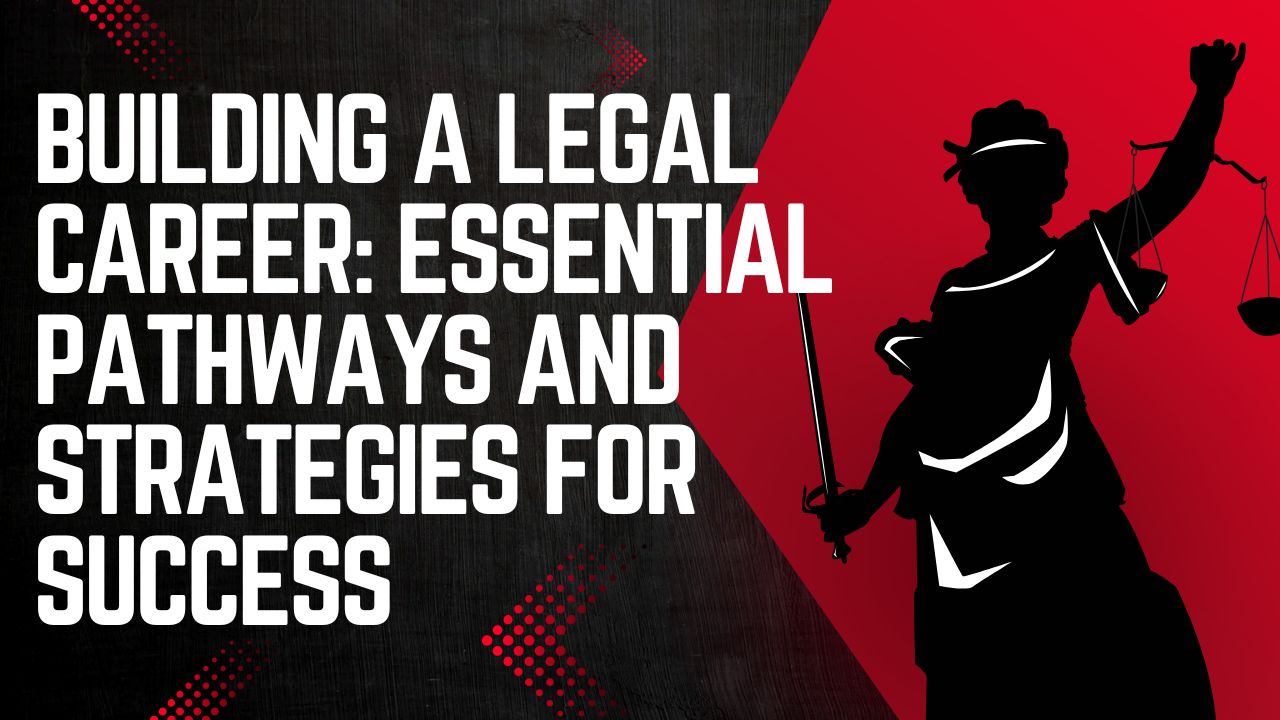Building a Legal Career: Essential Pathways and Strategies for Success

Advocacy in the legal field is not just about understanding the law; it involves embodying the principles of justice and service. You have the opportunity to explore various working streams that will enhance your skills as an advocate or law student. Whether you are considering pathways in legal practice, public interest work, or alternative dispute resolution, each stream offers unique benefits and challenges.
Engaging with these diverse areas will broaden your perspective and foster growth in your legal education. You can build a foundation that supports your career aspirations while promoting diversity, equity, and inclusion in advocacy. The insights gained will not only strengthen your legal knowledge but also prepare you to meet the evolving needs of the communities you aim to serve.
Understanding the different streams available will empower you to navigate your career with purpose. This journey can significantly impact your effectiveness as an advocate and the contributions you make to the justice system.
Key Takeaways
- Explore various legal practice areas to enhance your advocacy skills.
- Understand the importance of diversity and inclusion in legal services.
- Develop a strong foundation in legal theory to better serve your community.
Understanding Advocacy and Legal Services
Advocacy and legal services play crucial roles in promoting access to justice and social justice. You will learn about the meaning of advocacy, the structure of university law programs, and the importance of vocational training in legal settings.
The Meaning of Advocacy in Law
Advocacy in law refers to the act of supporting or arguing for a cause or policy. It encompasses a wide range of activities, from representing clients in court.
Advocates work to ensure that individuals receive fair treatment under the law. They often focus on marginalized communities, striving to amplify their voices within the legal system.
Some key components of advocacy include:
- Legal representation: Advocates provide legal counsel and courtroom representation.
- Public policy influence: They engage in lobbying efforts to effect legislative changes.
- Public awareness: Advocates inform the public about legal rights and social justice issues.
University Law Programs
University law programs provide foundational education for aspiring lawyers. These programs typically offer a comprehensive curriculum that includes subjects such as constitutional law, civil rights, and ethical practices.
Students will develop crucial skills, including critical thinking, legal research, and oral advocacy. Participating in internships or clinics through these programs allows students to gain hands-on experience in legal settings.
Consider the following aspects when evaluating law programs:
- Accreditation: Ensure the program is accredited by relevant authorities.
- Specializations: Look for options that focus on advocacy, public interest law, or social justice.
- Networking opportunities: Engage with alumni and professionals in the field for mentorship and job placement.
Vocational Training and Workshops
Vocational training and workshops enhance practical skills for advocates and law students. These programs often focus on areas such as negotiation techniques, trial advocacy, and client counseling.
Participants can benefit from interactive methods, including role-playing and case simulations. Workshops also provide an opportunity to learn from experienced practitioners and receive constructive feedback.
Key benefits of vocational training include:
- Skill development: Focus on practical applications rather than theory.
- Networking opportunities: Connect with peers and professionals in the field.
- Continuing education: Stay updated on emerging trends and practices in advocacy and legal services.
Practice Areas for Building a Legal Career
Understanding different legal practice areas is essential for advocates and law students. Each area presents unique challenges and opportunities that can shape your career path and influence your skills development.
Employment and Labor Law
Employment and labour law focuses on the relationship between employers and employees. You will deal with issues such as workplace discrimination, wrongful termination, and wage disputes.
Your work may involve representing clients in negotiations, drafting employment contracts, or advocating for workers’ rights. Familiarity with collective bargaining and union-related matters is crucial, especially if you engage with labour organizations.
Staying updated on legislation changes, such as minimum wage laws and occupational safety regulations, will strengthen your expertise in this field. Pursuing internships with law firms focusing on employment issues can provide valuable hands-on experience.
Family and Civil Law
Family and civil law encompass a wide range of legal matters, including divorce, child custody, and property disputes. In these areas, you will often advocate for individuals navigating emotionally charged situations.
Understanding the legal frameworks governing marriage, adoption, and guardianship is vital. You may also be involved in mediation processes to help clients reach amicable resolutions.
Civil law, which deals with non-criminal disputes, can include contracts, tort claims, and property law. Skills in negotiation and litigation are highly beneficial in these practice areas.
Human Rights and Social Justice
Human rights and social justice law focus on protecting the rights and dignity of individuals and marginalized communities. You may work with non-profit organizations or governmental agencies to address issues such as discrimination, refugee rights, and access to justice.
Advocacy in this field often requires strong research skills and the ability to navigate complex legal frameworks, including international laws. Engaging in community outreach or participating in human rights campaigns can enhance your practical experience.
Staying informed on global human rights issues and developing a network of contacts in social justice organizations will build your credibility as an advocate in this area.
Environmental and Administrative Law
Environmental law regulates the interaction between humanity and the environment. You will engage with policies related to natural resource management, pollution control, and sustainable development.
Your role may involve litigation against corporations for environmental harm or advising clients about regulatory compliance. Understanding legislation like the Clean Water Act or the Endangered Species Act is essential.
Administrative law governs the activities of governmental agencies. You may assist clients in navigating complex regulatory environments, appealing agency decisions, or advocating for policy changes. Strong analytical and communication skills are crucial to success in these fields.
Involvement in Community Legal Services
Community legal services play a vital role in providing access to justice for low-income individuals. You may work with legal aid organizations that offer representation in various issues, including housing, immigration, and family law.
Your involvement can range from direct client representation to policy advocacy aimed at systemic change. Gaining experience in this area enhances your understanding of the challenges faced by underserved populations.
Additionally, volunteering in community legal clinics will provide practical experience in case management and client interactions. This work can foster a deeper commitment to advocacy and contribute positively to your legal career.
Internships
Internships offer invaluable opportunities to apply your theoretical knowledge to real-world situations. They allow you to gain experience in different legal practice areas, build professional networks, and understand workplace dynamics.
Many law schools facilitate these programs, connecting students to firms, non-profits, or government agencies. Prioritizing internships in areas of interest can help you develop specialized skills and enhance your résumé.
Seek out experiences that align with your career goals, whether in litigation, corporate law, or public interest work. Engaging in these practical opportunities will significantly influence your professional growth and legal acumen.
Exploring Legal Theory and Practice
In the practice of law, understanding the intricacies of legal theory is essential. Familiarity with laws, precedents, evidence, and liability shapes your effectiveness as an advocate. Each component plays a crucial role in building compelling legal arguments.
Study of Laws and Precedents
Studying laws involves not just memorizing statutes, but also interpreting their application in various contexts. Keep track of relevant statutes as they evolve. Reading judicial opinions enriches your knowledge of how courts apply laws.
Precedents, or case law, serve as guiding frameworks for future cases. Understanding landmark decisions is vital. You should analyze how these cases have influenced current interpretations and rulings.
Compile a list of key cases that relate to your area of practice. Reference materials can include:
- Legal textbooks
- Journals
- Online Sources
Analysis of Evidence and Case Law
Evidence is the backbone of any legal argument. You must learn the types of evidence—testimonial, documentary, and physical—and their admissibility in court. Familiarize yourself with the rules governing evidence, such as the Federal Rules of Evidence.
Explore case law to understand how courts assess evidence. Analyzing past cases allows you to predict potential outcomes. Review motions and ruling documents to grasp judicial reasoning better.
Creating a checklist can help track essential documents needed for litigation. Essential points to consider include:
- Relevance
- Reliability
- Chain of custody
Understanding Insurance and Liability
Understanding insurance and liability is crucial for certain legal fields, especially tort law. You should familiarize yourself with various insurance policies and coverage types, such as general liability and professional liability.
Liability concerns arise from negligence, strict liability, and intentional wrongdoing. Analyzing these aspects helps you determine a party’s responsibility in legal claims.
Examine real-life scenarios where insurance claimed responsibility or denied claims. This practical knowledge enhances your ability to advise clients effectively. Focus on aspects like:
- Policy exclusions
- Claims processes
- Litigation strategies
Developing a grasp of these areas will empower you in legal discussions and negotiations.
Diversity, Equity, and Inclusion in Law
A focus on diversity, equity, and inclusion (DEI) within the legal profession enhances cultural competency and ensures fair representation. Addressing these areas is crucial for promoting equality and human rights in legal practice.
Cultural Competency and Representation
Cultural competency in law involves understanding the diverse backgrounds and experiences of clients. It enables you to provide effective legal representation by considering cultural factors that may impact legal issues.
Representation matters; clients are more likely to feel understood when they see their communities reflected in legal professionals. A diverse workforce can improve problem-solving and foster innovative solutions to complex legal challenges.
Developing skills in cultural competency can be achieved through training programs, mentorship, and engagement with various communities. This commitment not only strengthens your practice but also advances the principles of equity and inclusion in the wider legal landscape.
Frequently Asked Questions: Building a Legal Career
There are various opportunities for law students and legal professionals to increase their income through strategic planning and side hustles. This section addresses common questions related to generating passive income, suitable side jobs, and available employment options.
Which side hustles are well-suited for legal professionals seeking to work from home?
Freelance legal writing or consulting can be ideal for legal professionals. You can offer research services or contract review on platforms that specialize in legal work. Virtual assisting for attorneys or firms also allows you to leverage your skills from home.
How can lawyers supplement their income through side jobs?
Lawyers can take on roles such as mediators or arbitrators, which can be lucrative. Joining legal technology startups or offering freelance legal services are also viable options. Teaching legal courses online or in community colleges presents another chance to increase earnings.
What part-time opportunities are available for law students to increase their earnings?
Part-time internships at law firms or legal aid organizations provide practical experience and income. You might also consider roles in compliance or regulatory affairs that relate to your studies. Researching for professors or working as a paralegal can also enhance your financial situation.
What kind of summer employment opportunities exist for law students?
Law students can pursue summer positions at law firms or government agencies. Programs like articling placements offer valuable experience and a salary. Internship opportunities with non-profits or corporates also contribute to both learning and earnings.
How can a practicing attorney reach an income goal of 500k annually with additional revenue streams?
Diversifying practice areas or offering specialized legal services can attract more clients. Developing partnerships with other professionals for referrals and entering into high-demand niches can increase billable hours. Additionally, investing in real estate or starting a legal-related business could significantly bolster your earnings.










